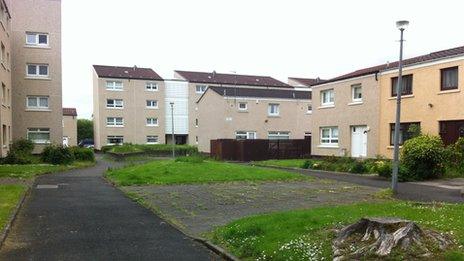'Bedroom Tax: early impacts' report says tenants need extra £11 a week
- Published

The new rules calculate housing benefit based on occupancy
Housing association tenants in Scotland are having to find an average of £11 a week more for rent because of housing benefits cuts, a report has suggested.
The UK government said the changes - dubbed the bedroom tax by opponents - would total £50m in Scotland this year.
But the Scottish Federation of Housing Associations (SFHA) said only £10m had been made available to help tenants avoid rent arrears.
The SFHA said this meant there was a "race" to access the cash.
The new rules mean families living in council or housing association accommodation whose property is deemed to be larger than they need have received less housing benefit since April.
Officially called the single room subsidy, the regulations allow one bedroom for each adult or couple.
Up to two children under the age of 16 are expected to share, if they are the same gender. Those under 10 are expected to share, whatever their gender.
The changes were expected to result in £490m savings for the taxpayer in 2013/14.
Limited funds
But in a survey of social landlords across Scotland - "Bedroom Tax: early impacts", external - SFHA found housing associations had already been experiencing dramatic increases in rent arrears and applications for emergency financial help within weeks of the implementation of the reforms.
The organisation's chief executive, Dr Mary Taylor, said this was exacerbating the challenges faced by the social rented sector, where Scottish government funding for investment in new homes had been cut by 53%.
She said: "We are seeing affected tenants race to access the limited £10m available in Scotland for discretionary payments.
"This is unsurprising given the 'bedroom tax' alone is expected to reduce housing benefit income for claimants by nearly £50m in 2013/14, according to DWP's own estimates."
The SFHA called on the Scottish government to restore funds cut from social housing to help build genuinely affordable homes.
Its report said: "The shortage of smaller properties means few tenants have the opportunity to avoid the under-occupation restriction by downsizing, and are left with having to find an extra £11 per week, on average, for rent."
It said the situation was likely to worsen, with nine in 10 landlords surveyed anticipating rents will increase in 2013/14.
Scottish Housing Minister Margaret Burgess said: "Despite Westminster's cuts to our capital budget, the Scottish government has taken every opportunity to increase its investment in housing.
"By the end of April we had allocated £200m additional funding for housing supply, bringing total investment to almost £860m in the three years to March 2015.
"This substantial boost to funding will support jobs in the construction sector and provide many more sustainable homes."
The Department for Work and Pensions (DWP) said it was working with agencies on putting the right budgeting support in place for those that needed it.
A spokeswoman said: "There are many alarmist claims about benefit changes but the facts are that our reforms will improve the lives of some of the poorest families and universal credit will make three million households better off."